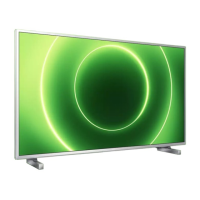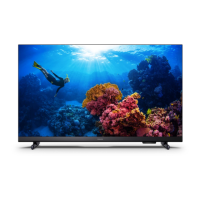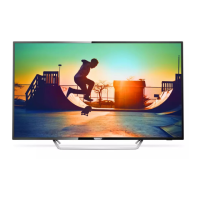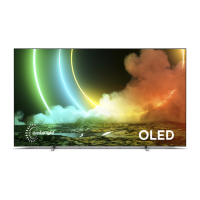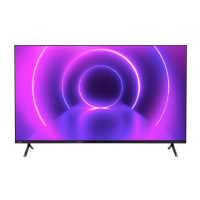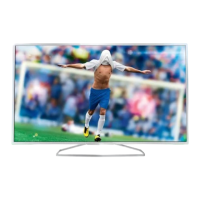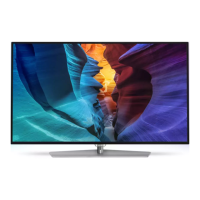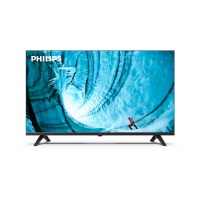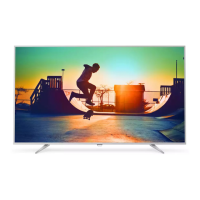Do you have a question about the Philips 6900 series and is the answer not in the manual?
Explains the Ultra HD display and its resolution for enhanced picture quality.
Connects the TV to the internet for a new world of television and smart features.
Browse and download apps, tailored websites, and online video stores for TV entertainment.
Allows renting the latest movies from a regional online video store directly from the TV.
Access social network pages to check friends' messages and interact from the TV.
Make free video calls on your TV using Skype, requiring a camera and internet connection.
Pause live TV broadcasts and record digital broadcasts using a connected USB Hard Drive.
Optimizes TV settings for gaming consoles and supports split-screen multiplayer games.
Operate connected devices with the TV remote control using HDMI CEC technology.
Read safety instructions before using the TV to prevent accidents and injuries.
Instructions for mounting the TV stand or using a VESA-compliant wall mount bracket.
Recommendations for optimal TV placement regarding light, distance, and eye level.
Connect the power cable to the TV and ensure socket accessibility. Unplug safely.
Connect the antenna cable to the ANTENNA socket at the back of the TV for signal reception.
Connect the TV wirelessly to a router for internet access and file sharing.
Connect the TV to the internet using a wired network cable for a stable connection.
Configure network settings like type, IP address, and Wi-Fi media playback.
Guides on connecting devices with the highest quality connection and using appropriate cables.
Operate connected HDMI-CEC devices with the TV remote and manage EasyLink settings.
Connect a set-top box using antenna and HDMI cables for TV signal reception.
Connect a Home Theater System using HDMI or SCART cables for enhanced audio.
Connect a DVD player via HDMI and operate it with the TV remote control using EasyLink.
Connect game consoles via HDMI or composite cables for gaming on the TV.
Connect a USB Hard Drive to pause or record TV broadcasts and format it for the TV.
Connect USB keyboards and mice for easier text input and navigation on the TV.
View photos, play music, and videos from a connected USB flash drive.
Connect a digital photo camera via USB to view photos directly on the TV.
Connect a camcorder via HDMI or composite cables to view video content on the TV.
Connect a computer via HDMI or DVI to use the TV as a PC monitor.
Connect headphones to the TV's 3.5mm jack and adjust the volume separately.
Instructions for turning the TV on from standby mode and switching it to standby.
Details the function of the TV's physical joystick and navigation keys for menu control.
Overview of the remote control's buttons, divided into Top, Middle, and Bottom sections.
Instructions for using the TV remote's integrated keyboard for text input and navigation.
Locates the IR sensor for remote control operation and explains RF vs IR.
Guides on pairing the remote control with the TV using radio frequency for communication.
Instructions for replacing the remote control's AAA batteries and proper disposal.
Provides instructions for cleaning the remote control using a soft damp cloth.
How to switch channels using the remote, channel list, and number keys.
Features for creating favorite channels, viewing lists, and managing channel logos.
Accesses channel options like closed captions, audio languages, and status information.
Guides for updating, reinstalling, and performing a full installation of TV channels.
Instructions for copying channel lists between TVs using a USB drive for easy setup.
How to open the Home menu and navigate through its activities like TV, Smart TV, and Help.
Information on viewing current and scheduled TV programs using the TV guide.
How to navigate the TV guide, tune to programs, view details, and change the day.
Displays connected devices and allows switching between them via the Sources menu.
Turn on connected devices like disc players or Home Theater Systems from TV standby.
Use EasyLink to operate connected devices with the TV remote via HDMI CEC.
Set the TV to switch to standby automatically after a preset time.
Change clock mode, set the time zone, or manually set the date and time.
Deactivate the automatic turn-off feature to prevent the TV switching off unexpectedly.
Requirements for watching 3D content, including compatible glasses and connections.
Overview of 3D glasses, their operation, battery replacement, and battery level check.
Instructions on how to clean and care for 3D glasses to ensure their longevity and performance.
Guidance on optimal viewing distance and switching between 2D and 3D modes for immersive viewing.
Recommendations for seating distance, lighting conditions, and avoiding interference for the best 3D experience.
Important health and safety warnings regarding 3D viewing, especially for children and those sensitive to light.
Connect a game console and set the TV to ideal Game setting for optimal gaming performance.
Instructions for playing two-player games using split-screen view and 3D glasses.
View photos, play music, and videos from USB devices or network computers.
Share smartphone, tablet, or computer screens wirelessly on the TV using Miracast.
Pause live TV broadcasts and resume watching later using a USB Hard Drive.
Requirements for recording TV programs: USB Hard Drive, digital channels, and TV guide data.
Instructions for recording the current program or scheduling future recordings.
How to watch recorded programs, manage expired or failed recordings, and delete recordings.
Make free video calls on your TV with friends worldwide using Skype.
Connect a Philips TV camera for Skype video calls and learn about network requirements.
Sign in to your Skype account to start making video or voice calls on the TV.
Overview of Skype menu items: profile, contacts, call phones, history, and settings.
Edit your personal Skype profile, including public info, phone numbers, and profile picture.
Manage your Skype contacts, add new contacts, and accept contact requests.
Make video or voice calls, mute microphone, and manage camera settings during calls.
Call landline and mobile phones using Skype Credit or subscription.
Buy Skype Credit or subscriptions to make calls to phones and mobile phones.
Configure Skype settings: auto sign-in, privacy, password, blocked contacts, and voicemail.
Sign out of your Skype account to change your online status to Offline.
Exit the Skype application on the TV to free up resources.
Access Skype's terms of use and privacy policy for information on usage.
Connect to the internet for a world of television, streaming, and smart services.
Requirements for Smart TV: router, broadband connection, and optional keyboard/mouse.
Configure your Smart TV connection, agree to terms, and register for services.
Access apps, rental videos, news, social networks, and the internet via the Smart TV start page.
Watch current TV channels alongside Smart TV apps or internet content in a split screen.
Clear internet memory to reset Smart TV registration, parental settings, and app data.
Stream TV programs from one TV to another within your home network.
Requirements for Multi Room: two Philips TVs connected to the same network with compatible software.
Steps to start and use Multi Room for the first time, including browsing network content.
Share current channel, program info, or internet site addresses on social networks via the Share this menu.
Quickly adjust picture and sound settings, access TV settings, and manage channel search.
Adjust picture style, color, contrast, sharpness, and advanced picture settings for optimal viewing.
Adjust sound style, bass, treble, and headphone volume for preferred audio output.
Enable key beep for audio feedback on button presses and adjust TV placement settings.
Information on energy saving features, screen care, and product disposal.
Details antenna input specifications and TV system standards supported.
Specifications for screen size, resolution, 3D capabilities, and input resolutions.
Power specifications including main power, ambient temperature, and standby power consumption.
Physical dimensions and weights of the TV models with and without the stand.
Lists all available rear, side, and bottom connectivity ports for various devices.
Details supported file systems, video/audio codecs, subtitle formats, and image codecs.
Instructions for updating TV software via USB or directly from the Internet.
How to view the current TV software version and release information.
Information about open-source software used in the TV and how to obtain source code.
Details acknowledgements and license texts for open-source software used in the TV.
Guides for resolving common TV issues related to channels, sound, picture, and remote control.
Register your TV to receive benefits like full support, new product info, and special offers.
Access on-screen help, search topics, or download the user manual for assistance.
Consult Philips online support for troubleshooting, FAQs, downloads, and contact information.
Contact Consumer Care for support and repair, and find your TV's model and serial number.
Important safety instructions to prevent electric shock, fire, injury, and TV damage.
Guidelines for cleaning the TV screen and frame to avoid damage and ensure longevity.
Legal terms, warranty information, and disclaimers regarding the product and its manual.
Information on trademarks like HDMI, Dolby, and licensing details for software components.
| Display Type | LED |
|---|---|
| Smart TV | Yes |
| USB Ports | 2 |
| Refresh Rate | 60 Hz |
| Dimensions (Without Stand) | Varies by screen size |
| Weight (Without Stand) | Varies by screen size |
| Resolution | 4K UHD (3840 x 2160) |
| HDR | Yes, HDR10, HLG |
| Ambilight | Yes |
| HDMI Ports | 4 |
| Screen Size | 43", 50", 55", 65", 70" |
| Connectivity | Wi-Fi, Ethernet, Bluetooth |
